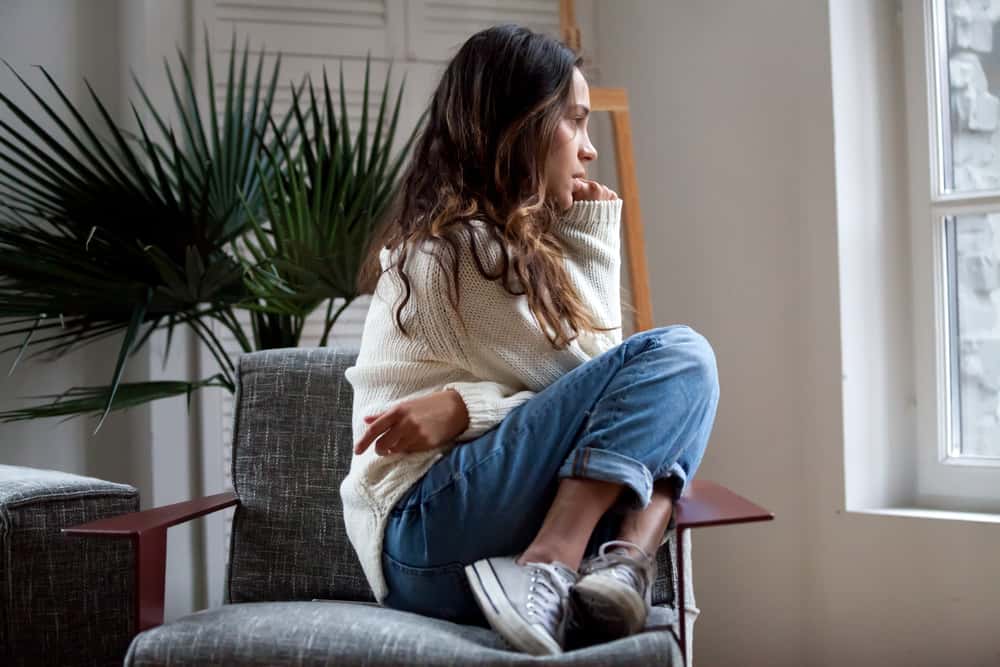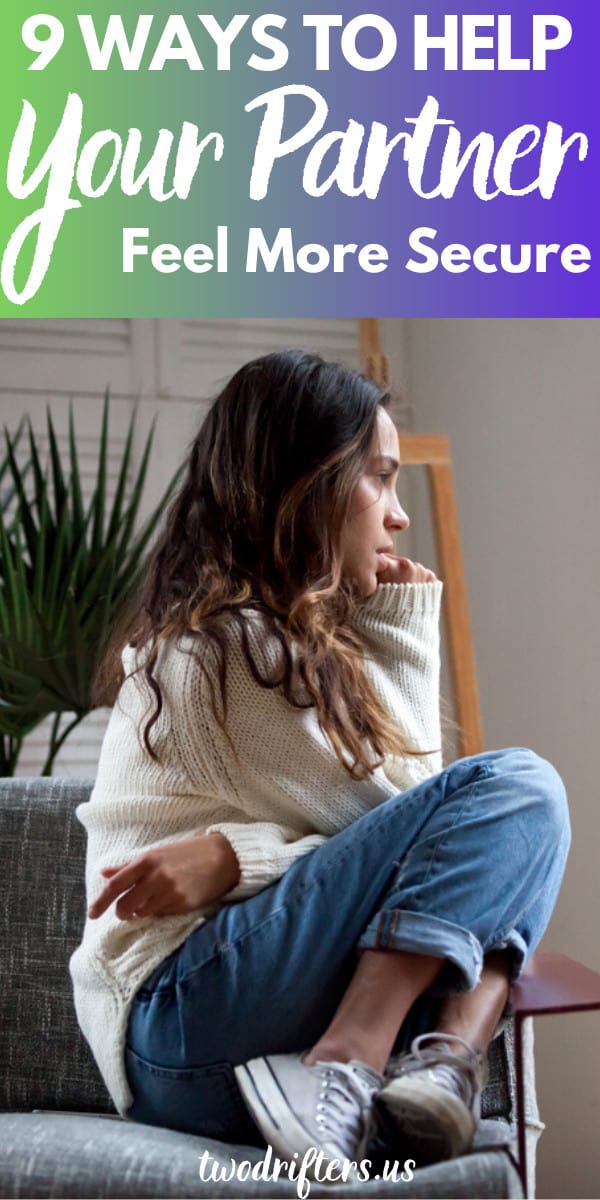This post may contain affiliate links. Read our disclosure page for full details.
We all want to feel safe and secure in our relationships; particularly our romantic relationships. But it’s not always easy.
As with anything meaningful in life, anxiety often attacks the things we care about most. Anxiety in relationships is very common, and it can come in the form of jealousy, doubts, fear, withdrawal and more. For many people, this anxiety can reveal itself in the form of a lack of security in a relationship.
And whether you’re in a new relationship or have been with someone for a while, security is something that is not uncommon to struggle with. There are many reasons you might be dealing with insecurity in your relationship. But what if it’s your significant other who is struggling? How can you help support a partner who feels insecure? How can you make your partner feel more secure in your relationship? How can you reassure someone that you love them? We’re going to answer all those questions and more now, giving you some practical tips on helping your partner feel as secure as possible.
PS: Kudos to you for seeking out this resource. You rock. The fact that you are looking for ways to better support your partner shows tremendous understanding and compassion. Keep it up! This kind of effort is a huge part of happy relationships.
Understand What’s Going On
First, know that insecurity can come in many forms. Is your partner fearful that you’re cheating on them? Do they get suspicious when they don’t hear from you? Do they question your friendships or your actions?
This type of insecurity, showing up as jealousy, is different than relationship insecurity that shows up in other ways.
Perhaps your partner lacks assertiveness and avoids conflict because she’s afraid of losing you. Maybe she worries constantly about your feelings for her and frequently looks for reassurance from you that you care.
You need to know what it is you’re dealing with before you proceed.
Learn to Listen
There are a few ways to understand your partner’s fears and insecurities. Over time, you no doubt notice behaviors or habits that may indicate a lack of security. But the best way to understand what’s going on is to talk about it with your partner.
This isn’t always easy. Many people don’t readily talk about their insecurities, let alone admit them. So you may need to be patient as you wait for your partner to open up. Let them know that you are there for them.
The key is to listen, and listen well. Not just to the words they are saying, if they are willing to discuss the issue, but to what they aren’t saying. What does their body language indicate? What do their actions suggest? You don’t need to be a psychologist to spot some of these insecurity-driven behaviors.
You can learn more about listening skills in our post: 5 Tips for Better Communication in Relationships.
Address What You Can
If they’re willing to share with you (or if you think you’ve got a pretty good idea of what’s going on), you can address whatever circumstances or issues you are able to. This means looking for practical ways that you can help alleviate their concerns and fears though your own actions. If your partner experiences jealousy and suspicion, maybe you can arrange for a way to be more transparent about your activities. Discussing this together can help you come to some realistic expectations that work for everyone.
Obviously, both partners will need to make an effort. You can be fully transparent about your movements, etc, but your partner’s insecurity won’t go away until she finds ways to build trust and overcome insecurity.
Remember, you can help, but you can’t fix the problem. Insecurity runs deep.
Don’t Try to Solve It
Speaking of not being able to fix the problem, this is a big one to remember. When we just want our partner to feel better, we think “maybe I could solve their problem, maybe I could help them heal.”
While you can be an instrument in their healing, they need to take action on their own. For severe insecurity or anxiety that is affecting your relationship or the wellbeing of one or both partners, I recommend considering professional therapy. Therapists can help so much with these issues, and talking through them with an expert can be key to healing. Therapy is something I’ve used on my own journey to lessen my anxiety in relationships.
Consider Your Actions
If you have a partner who deals with insecurity in relationships, it can be really helpful for you to be extra mindful of your actions. This demonstrates tremendous kindness and thoughtfulness, and the difference it makes can be huge.
Maybe your partner has a lot of insecurity about his own worthiness and love-ability. Maybe he lacks self-confidence and doesn’t understand why you would choose to be with him. In this type of instance, you can be mindful of the way your actions (or your words) might be interpreted by him. In making a decision to spend an evening with friends, for example, you might take extra care to let him know that you’ll miss him and that you can’t wait to see him this weekend. While it won’t remove feelings of insecurity, it can help alleviate it. Little gestures like that can mean the world to the anxious, insecure partner.
Love Them How They Need to Be Loved
One of my favorite tips for improving security in a relationship is discovering one another’s love languages. The ways in which we feel and express love differ from person to person, and understanding your partner’s can make showing support and love SO MUCH EASIER. Wondering how to reassure someone you love them? Say it in their love language!
If you’ve ever given your partner a comforting hug that didn’t seem to help, or offered them an expensive, thoughtful gift that they mostly ignored, chances are you might not be speaking their love language. Check out this quick guide to the 5 love languages, and discover how you can better show your partner love: in the way they will best understand it.
Ask What They Need
Want to help your partner feel more secure? Encourage open conversation between you discussing your needs. Sometimes, a person will tell you exactly what’s wrong and how to help them: all you have to do is ask.
Ask your partner what could help them to feel more secure, more loved, and less fearful. What can you do to show them you care or demonstrate your commitment to the relationship? Hopefully, together you can come up with some go-to strategies that will have the two of you growing closer—and both of you feeling more secure in your relationship.
And Then Do It
Once you’ve discussed ways that you can help, don’t forget to do them! This is extra important because your partner lacks security, remember? If you don’t come through with what you said you would do, it can have the unfortunate effect of worsening the anxiety or contributing to the problem. That’s not to say that you won’t mess up (you will, and that’s ok) but do your best to show up for your partner and help them in the ways they asked.
For me and my husband, he learned early on how important it is to me to be told “I love you” very often. This would combat my fears that my husband would leave me or stop loving me. He started doing it from the beginning, and over time, I’ve grown incredibly secure in his love. His willingness to say the words consistently was amazingly helpful to me.
Be Patient
Finally, don’t forget to be patient with your insecure partner. Growing more secure in a relationship takes time (a whole lot of time for some of us) so approach your significant other with patience, compassion, and understanding.
As you work on these things together, your partner should be willing to compromise and make adjustments for you, too. Remember that relationships are a two-way street, and you both need to work together to create deeper security and a stronger bond. However, insecurity can be debilitating, so you may have to give more than you receive for a season, knowing that your partner will do the same for you when necessary. That kind of sacrifice and generosity is one of the best indicators that you’re in the type of relationship that will go the distance.
Read these next:
- 12 Essential Pieces of Relationship Advice for Couples
- How to Strengthen Your Marriage: 6 Things to Do Every Day
- 9 Tips for Dealing With Separation Anxiety in Relationships
- Top 10 Relationship Green Flags for a Healthy Relationship
- 10 Ways to Maintain Connection in a Relationship
- How to Save Your Marriage: 7 Tried & True Tips for You

Amy Hartle is the author of Do You Love Me? How To Stop Seeking Reassurance in Relationships, a book on reassurance seeking and relationship anxiety. Both her book and this blog are born of personal experience; Amy shares expert relationship advice from the lessons learned during her own 10+ years with her husband, as well as couples travel tips and romantic getaway recommendations, all gleaned while traveling the world together.







